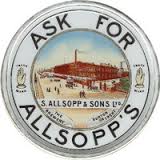 Here’s another extract from T.Earle Welby’s The Dinner Knell of 1932. This time the epicure voices an opinion which in the seventies era of the Almighty Keg would not have been accurate but which, thanks to the influence of CAMRA and other campaigning groups, may possibly ring true today.
Here’s another extract from T.Earle Welby’s The Dinner Knell of 1932. This time the epicure voices an opinion which in the seventies era of the Almighty Keg would not have been accurate but which, thanks to the influence of CAMRA and other campaigning groups, may possibly ring true today.
‘Beer abides and the best of it now is as good as English beer ever was. This is not a fashionable thing to say. For years the air has been full of the moanings of those who imagine a golden age for beer, and suppose it to have been destroyed by the wickedness of the great breweries. The truth of the matter is that, until the nineteenth century was pretty well advanced, most small brewers and vendors, secure in local monopoly, adopted the most vicious methods with beer.
As late as 1824, the author of The Private Brewery wrote: ‘It has seldom been my fortune in a great number of years to taste unadulterated purchased ale, whether brewed in the metropolis or in the brewing districts of the country’. For years before that date and for some years later an extremely harmful and highly intoxicating drug, the Indian berry ( coccollus Indicus) was freely used in beer ; and willow bark, walnut leaf, quassia, gentian, aloes, entered into the production of what was sold in hundreds of establishments and more particularly in the abominable beer-houses produced by the Duke of Wellington’s Act. However, the limited number of favourably placed individuals may have fared, the nation as a whole never had pure beer, wholesome and maintained to the standard of the particular brewery, until such great concerns as Barclay, Allsop, Bass rose into command of the market. But that the evil continued longer than is commonly supposed is made manifest in a piece of evidence which will probably be unfamiliar to most people in this country. I call as witness Baudelaire, who, writing to Alfred de Vigny, I think somewhere about the year 1860, most earnestly warned him against drinking any English beer available in Paris except that emanating from Messieurs Allsop or Messieurs Bass, a touching proof on one great poet’s solicitude for the health of another, but more pertinently for us, a reminder that the evil continued into a time within the memory of still-living veterans ‘.
And as for the adulteration of beer in Georgian times and later, one only has to read Death in the Pot (1820), a pioneering study by the chemist Frederic Accum, to have this confirmed. [R.M.Healey]

The English tradition of bad beer is long and dishonourable: see Skelton’s The Tunning of Elinor Rumming: http://www.poemhunter.com/poem/the-tunning-of-elenor-rumming/